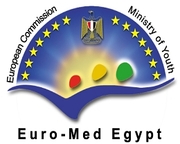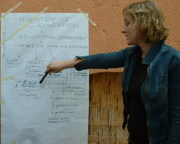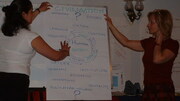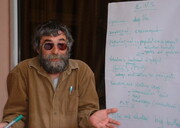Education and Civilisation
Background:
Education and Civilisation have been overlapping since ever. Every civilization contributed to the cultural history of the world. Education too contributed to the creation of modern societies. In the framework of the EuroMed YOUTH programme this relation is even more stressed. One of its actions, the voluntary service, is not developed as much as it could be.
The educational approaches and attitudes are not identical, not only between both sides of the Mediterranean Sea but also among countries of the same geographical area. The purpose of this course was also to reflect on the influence of civilisations in the educational systems and on the necessary conditions for implementing a qualitative voluntary service project (Action 2) within the Euro-Mediterranean co-operation.
Dates:

This course took place from July 23rd - 30th, 2005 in Cairo (Egypt). It was organised in cooperation with the National Coordinator for the EuroMed YOUTH Programme in Egypt.
Aims and Objectives:
This course aimed at realising and concretising the links between education and civilisation and at checking whether they are a driving force or a brake to the qualitative development of Euro-Mediterranean voluntary service.
The following concrete objectives have been set in order to reach the aims as described above:
- to become acquainted with the Euro-Mediterranean civilisations and the mutual influences they had upon each other;
- to reflect on how civilisation influenced educational systems and the latter (non-formal) educational attitudes on both sides of the Mediterranean Sea;
- to compare the different educational systems and analyse their similitudes and differences;
- to exchange concepts of voluntary services;
- to acquire competencies to assure a qualitative mentorship within the context of the Euro-Med YOUTH Programme;
- to create a technical and educational guide for implementing a Euro-Mediterranean voluntary service.
Profile of participants
The course is intended to be an opportunity for further training for youth workers and youth leaders who:
- are experienced in the Euro-Med YOUTH Programme (Actions 1, 2 & 5);
- are committed to prepare themselves for the handled subjects, previous to their arrival and to do the remote work requested by the team in case of selection;
- are motivated to undergo training and able to attend the course for its full duration;
- are supported by their organisation and have green light for implementing a Euro-Med YOUTH project;
- are able to communicate and work in at least one of the three working languages of this training course (English, French and/or Arab);
- are resident in a Member State of the European Union or in a Mediterranean country signatory to the Barcelona Declaration.
Expected Outcome
The participants were expected:
- to enrich their knowledge and understanding towards the different civilisations and educational systems in the Euro-Mediterranean region;
- to develop a voluntary service project (Action 2) within the Euro-Med YOUTH Programme as result of the course.
Methodology
The course will be based on the principles and practise of non-formal education and is conceived to allow a learner-centred approach based on active and interactive methods. Participants need to self organise part of the activities and thus take a personal responsibility for their learning process. They should be open for an experiential learning experience.
Programme Elements
The course programme will address the following key modules (the modules are described by a set of issues which are indicative and not exhaustive and will be developed further):
- Why Euro-Med co-operation projects?
- Communication and group dynamics;
- Education and Civilisation in the Euro-Mediterranean region;
- Definitions of civilisation, educational systems, and educational attitudes;
- Intercultural awareness;
- International teamwork;
- Overall evaluation of the course;
- Suggestions for follow-up

 Discussing educational systems
Discussing educational systems Comparing civilisations
Comparing civilisations EVS in EuroMed context
EVS in EuroMed context
